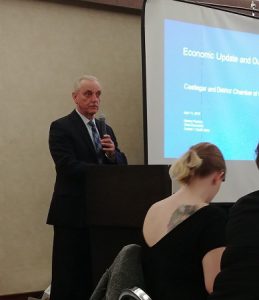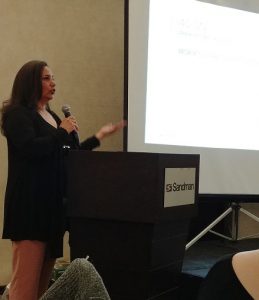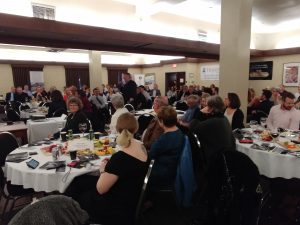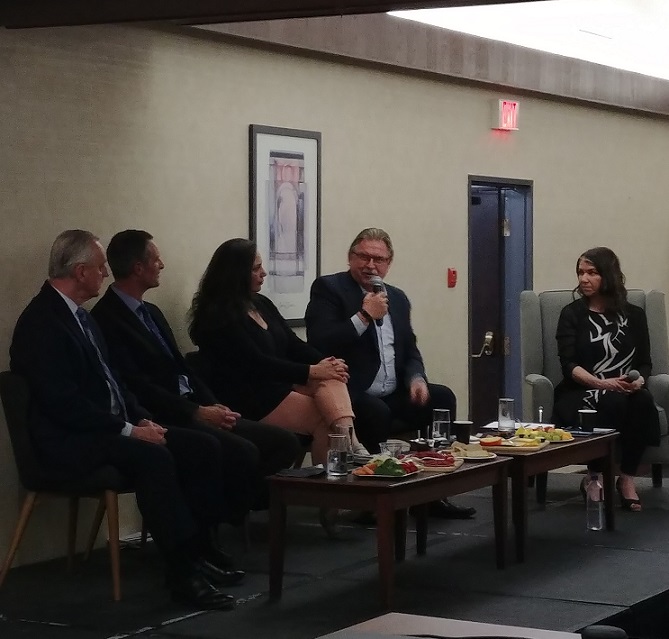It was a sold out event for the first ever State of the Kootenays: An Economic Update in Castlegar yesterday. The event was organized by the Castlegar and District Economic Development Office and Chamber of Commerce.
Renowned economist Helmut Pastrick opened the evening as the keynote speaker. Pastrick is the chief economist for Central 1 Credit Union and looked at number of economic and demographic trends for the Kootenays. He anticipated the “housing correction” will continue as restrictions are imposed on lenders and credit conditions are tight.
“We’ve had a tighter underwriting conditions, we’ve had the stress test, the B-20 regulations that have restricted the sales activity and limited the credits. The cliché I like to use is credit is cheap, if interest rates are low. But it’s not readily available, you have to be a very good borrower to obtain credit.”
He projects a seven per cent sales decline for the region that he doesn’t classify as a recession, but some softness in the housing market. Overall, he describes the prospects as reasonably good for the central Kootenay.
After Pastrick’s keynote address, three local panelists had 10 minutes each to speak on the successes and some of the challenges they face. One was CEO of Kalesnikoff Lumber, Ken Kalesnikoff, who explained the timber industry has seen its share of change over the years.
“All the scanning the electronics, the technical stuff, what our guys have to do today, to run that equipment, it’s mind boggling.”

They’re good, high-paying jobs, he adds. Kalesnikoff Lumber contributes $30-million into the local economy and the business is expanding with a new mass timber facility that will create 50 local jobs.
“As an industry we’re better than just making 2x4s and conventional lumber and should be leading in innovation. Somewhere we lost that and we need to get that back. There’s a lot of opportunity out there with wood, and we need to be able to utilize that,” Kalesnikoff said.
Some of the challenges Kalesnikoff highlighted are felt both from abroad and locally. As a global supplier, government subsidies in other countries can pose challenges as well as government red tape at home. Kalesnikoff highlighted caribou conversation and forest fires as current issues. He says while we need to diversify and attract new business, one thing that can really help the locally economy is working with the businesses already here and asking what can be done to help them flourish.
Another panelist was Pilar Portela, CEO and owner with i4c Innovation in Trail, which is Canada’s first Innovation 4.0 Hub. Like Kalesnikoff, Portela spoke about thinking beyond the rural resource driven economy, and adapting to technological change.
“We need to be part of it, bigger than it and larger than our own region because, what the industry 4.0 and all of the tools that we have right now allow us to be, is global from right here, without having to go anywhere. To be able to achieve many of the goals that we didn’t think before could be possible.”
Portela identified our own self-imposed limitations as one of the struggles facing the Kootenays. She says every who lives here should be considered an entrepreneur as we’re choosing to make a living in an area where it isn’t always easy. She suggests “extreme collaboration” as another necessity. Right now, Portela’s currently working on a massive project that includes academic, industry and not-for-profits where they can all come to the table and use technology to solve larger issues.
She closed with a slide of the United Nations’ Sustainable Development Goals. She feels it’s possible to think big and impact change from the Kootenays.
Angus Graeme, President with Selkirk College, also spoke about the changing student demographic and keeping talent within the region. There are 95 credentials available through the college and its total annual added income for the region is estimated at over $272.2-million or 3,741 jobs supported.

One of the struggles the college continues to face is decreasing government grants. The college is considered a not-for-profit and isn’t allowed to have a a surplus at the end of the year, Graeme explained.
The event also raised some funds which will be going towards scholarships at Selkirk College and a trip for Stanley Humphries students to tour some of the big tech companies in the Lower Mainland such as Microsoft. Economic Development Officer, Mark Laver, also suggested the idea of bringing the students to tour the Kalesnikoff mill in Thrums, which was well received by its CEO. All agreed that more events of this nature were important in order to come together, share, and foster collaboration.





